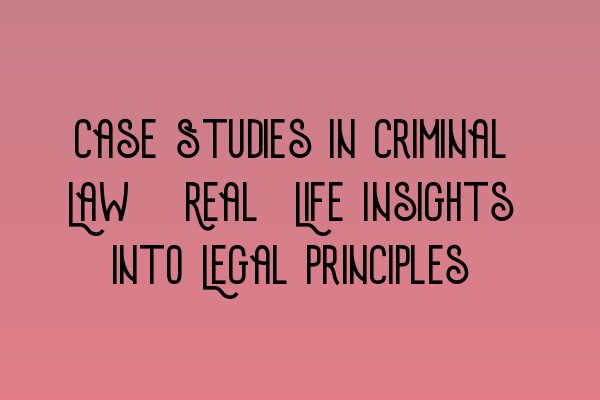Case Studies in Criminal Law: Real-Life Insights into Legal Principles
As a leading solicitor firm specializing in criminal law, SQE Criminal Law & Practice Law UK has handled numerous cases that have provided invaluable insights into the field. In this blog post, we will delve into some real-life case studies and explore the legal principles involved.
Theft: Case Study 1
One of the most common criminal offenses is theft. In Case Study 1, a defendant was accused of stealing valuable jewelry from a high-end store. Our team meticulously analyzed the evidence, including surveillance footage and witness testimonies, to build a strong defense for our client.
The key legal principle in this case was the concept of “mens rea,” or the guilty mind. We argued that our client had no intention to commit theft, presenting evidence to support their innocence.
For further insights into theft cases and related legal principles, you can refer to our article on SQE 1 Practice Exam Questions.
Murder: Case Study 2
Murder cases are often the most complex and challenging in criminal law. In Case Study 2, our firm represented a defendant accused of murder in the first degree. We meticulously studied witness testimonies, forensic evidence, and expert opinions to build a compelling defense strategy for our client.
The legal principle of “actus reus,” or the guilty act, played a crucial role in this case. We presented evidence to cast reasonable doubt on our client’s involvement in the crime, ensuring that justice prevails.
If you’re interested in learning more about murder cases and related legal principles, we recommend reading our article on SQE 1 Practice Mocks FLK1 FLK2.
Drug Possession: Case Study 3
Drug possession charges can have severe consequences for the accused. In Case Study 3, our firm successfully defended a client charged with possession of a controlled substance. To build a strong defense, we scrutinized the search and seizure procedures carried out by law enforcement officers.
The legal principle of “chain of custody” played a critical role in this case. We argued that there were significant gaps in the chain of custody, raising doubts about the integrity of the evidence presented by the prosecution.
To gain further insights into drug possession cases and related legal principles, we encourage you to read our article on SQE 2 Preparation Courses.
Sexual Assault: Case Study 4
Sexual assault cases require sensitivity and expertise. In Case Study 4, our firm represented a client who was wrongfully accused of sexual assault. We worked tirelessly to gather evidence, including medical reports and witness testimonies, to build a strong defense strategy.
The legal principle of “consent” played a central role in this case. We meticulously examined the circumstances surrounding the alleged assault to demonstrate that our client had obtained full and voluntary consent.
If you want to delve deeper into sexual assault cases and related legal principles, we invite you to read our article on SQE 1 Preparation Courses.
Conclusion
These case studies offer a glimpse into the complex world of criminal law. By understanding the legal principles at play, we can navigate through challenging cases and ensure justice is served.
At SQE Criminal Law & Practice Law UK, we are dedicated to providing expert legal representation and upholding the highest standards of professionalism. If you require assistance with a criminal law matter, please don’t hesitate to contact us.
For more information on upcoming SRA SQE exam dates and preparation resources, you can visit our article on SRA SQE Exam Dates.
